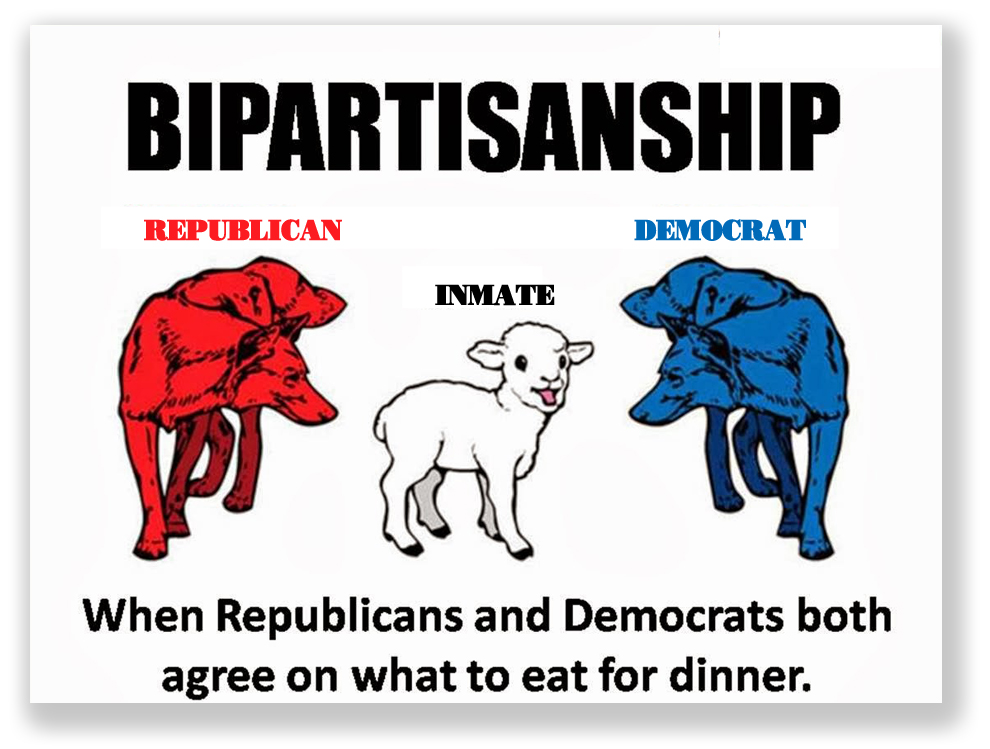Vol. 2, No. 10
This week:
English 101
It’s Good To Be The King
Plea Bargaining “A Monster”
What’s Yours Is Mine
You Must Act Now
Take Your Time
Could Supreme Court Nominee Battle Help Pass Criminal Reform?

ENGLISH 101
 Remember how bored you were in the back of the classroom while your English teacher droned on about conjugation, dependent clauses and prepositional phrases? Here’s another reason you should have paid attention.
Remember how bored you were in the back of the classroom while your English teacher droned on about conjugation, dependent clauses and prepositional phrases? Here’s another reason you should have paid attention.
Lockhart pleaded guilty to possessing child pornography. Because he had a prior state court conviction for first-degree sexual abuse involv¬ing his adult girlfriend, the district court held that he was subject to a 10-year sentence enhancement triggered by conviction for a crime “relating to aggravated sexual abuse, sexual abuse, or abusive sexual conduct involving a minor or ward.”
Lockhart argued that the limiting phrase “involving a minor or ward” applied to all three state crimes, so his prior conviction should not trigger the enhancement. But last week, the Supreme Court disagreed. The majority applied the Rule of the Last Antecedent – a rule of statutory interpretation holding that “a limiting clause or phrase … should ordinarily be read as modifying only the noun or phrase that it immediately follow.” The rule means that the phrase “involving a minor or ward” modifies only the immediately preceding noun phrase “abusive sexual conduct.” The phrases “aggravated sexual abuse” and “sexual abuse” are not restricted by the modifier.
The 6-2 opinion admitted that the Rule of the Last Antecedent “can . . . be overcome by other indicia of meaning,” but argued that here, the statute’s context reinforces the conclusion that sexual abuse against anyone – not just a minor – was enough to trigger the enhancement.
Lockhart v. United States, Case No. 14–8358 (Supreme Court, Mar. 1, 2016)

IT’S GOOD TO BE KING
Back in the Days of Yore, peasants were simply not allowed to sue the King. Or do anything else, for that matter. Times have changed, but the notion that you cannot sue the king survives in a doctrine known as “sovereign immunity.” In other words, us peasants may not sue the government, unless we get permission from the government to do so
In the case of the federal government, permission comes in the form of the Federal Tort Claims Act, which grants permission to sue the Feds for certain kinds of wrongs, but not others.
 The FTCA is what Frank Douglas turned to when he thought he’d been cheated out of BOP inmate pay. Frank was a Performance Grade I inmate employee, working 154 hours a month running a cardboard recycler at FCI Coleman. His boss agreed that he had $91.00 a month coming, but when got paid, Frank found his pay had been cut to about $7.00. Frank alleged his pay had been cut by a lieutenant who said he didn’t “like Inmate Douglas black ass and I’m going to pay him what I want.” Predictably, the government moved to dismiss, arguing that paying inmates for their work was a purely discretionary function, and thus the L-T’s conduct couldn’t be reached under the FTCA.
The FTCA is what Frank Douglas turned to when he thought he’d been cheated out of BOP inmate pay. Frank was a Performance Grade I inmate employee, working 154 hours a month running a cardboard recycler at FCI Coleman. His boss agreed that he had $91.00 a month coming, but when got paid, Frank found his pay had been cut to about $7.00. Frank alleged his pay had been cut by a lieutenant who said he didn’t “like Inmate Douglas black ass and I’m going to pay him what I want.” Predictably, the government moved to dismiss, arguing that paying inmates for their work was a purely discretionary function, and thus the L-T’s conduct couldn’t be reached under the FTCA.
The FTCA’s discretionary function exception does not waive sovereign immunity for claims “based upon the exercise or performance or the failure to exercise or perform a discretionary function or duty on the part of a federal agency …” The government argued that because the BOP doesn’t have to give inmates jobs to begin with, then obviously, whether to pay them is discretionary as well.
Last week, the 11th Circuit rejected that defense. The court held that the “discretionary function” issue relates to the individual employee – in this case, whether the lieutenant had discretion – not whether the BOP had discretion. Here, the BOP had rules that give prisons discretion to decide which inmates will work and which types of work, if any, will be compensated at which pay grade. But once an inmate’s work is assigned a pay grade and evaluated by his supervisor, the rules made clear that the inmate is entitled to the pay that the supervisor computed. The lieutenant had no discretionary right to change pay that was vested.
Besides, the court said, “if as Mr. Douglas claims, Lt. Barker unilaterally altered Mr. Douglas’s wages out of racial animus, Lt. Barker’s conduct, even if discretionary, “cannot be said to be based on the purposes that the regulatory regime seeks to accomplish.”
Douglas v. United States, Case No. 14-11444 (11th Cir. Feb. 29. 2016)

PLEA BARGAINING IS “A MONSTER”
Another respected federal judge sharply criticized the criminal justice system recently, focusing primarily on plea bargaining.
“We created this monster and it’s taken on a life of its own,” U.S. District Judge Jed Rakoff (S.D.N.Y.) said during a symposium on crime at John Jay College of Criminal Justice on Feb. 25. He said even in the Southern District of New York – a fairly progressive federal court – his judicial  colleagues think sentencing offenders to long prison terms is fair.
colleagues think sentencing offenders to long prison terms is fair.
Judge Rakoff said he’s seen the system change in the past few decades, from a time where 15 percent of federal criminal cases went to trial to only 3 percent currently. He called the plea bargaining process a “system of totally secret justice” where prosecutors hold “all the cards” and are able to get a vast majority of defendants to plead guilty to charges when faced with extremely long sentences imposed through sentencing guidelines or mandatory minimums.
Julie Seaman, a law professor and president of the Georgia Innocence Project, told the symposium it’s “completely rational for an innocent person to plead guilty because there is so much risk involved in going to trial.” The plea bargaining is done behind closed doors, and “because it’s so totally untransparent,” Judge Rakoff said, it will “inevitably going to lead to some serious mistakes.”
Rodney Roberts, a New Jersey man who pled guilty to a crime of which he was exonerated (only after serving 17 years in prison), said he faced a life sentence if convicted at trial. He said, “Most people ask, ‘What would make an innocent person plead guilty?’ Most people say, ‘Oh I wouldn’t have done that. I would have fought for my innocence.’ My response is always the same, I say, ‘I hope you’re never in that situation.’”
Roberts called it an “assembly-line” process where his overworked public defender coerced him into to take a deal. “I thought, ‘This is the only guy who is on my side,’ if he’s telling me this, then what chance do I have?” he said.
Judge Rakoff said he decided to speak out a few years ago after thinking about all the cases where he was encouraged to impose increasingly longer sentences on low-level criminals. He said the judicial code encourages judges to speak out, but not enough judges do so. “It’s very worrisome to me,” he said. “Who is going to judge the judges? It will be history …”
Wisnieski, “A ‘Draconian’ System Where the Innocent Plead Guilty,”
The Crime Report (Feb. 26, 2016)
WHAT’S YOURS IS MINE …
“Possession” can be a slippery concept. Last week, the 8th Circuit made it a bit slipperier.
Patrelle Green-Bowman and three others were riding in a car stopped by police. A shotgun lay on the back seat, wrapped in Patrelle’s jacket. Patrelle, having a criminal record, was convicted of being a felon-in-possession.
 Patrelle argued on appeal that the government had not proved that he – as opposed to other folks in the car – possessed the shotgun. The 8th Circuit rejected his defense. “As we have repeatedly explained,” the Court said, “more than one person may possess a thing. And that remains true even though the government focused on Green-Bowman and did not tell the jury a story about someone else possessing the gun along with him. Without evidence someone else had exclusive control over the shotgun, the presence of other people who might have possessed the weapon does not prove Green-Bowman did not also possess it.”
Patrelle argued on appeal that the government had not proved that he – as opposed to other folks in the car – possessed the shotgun. The 8th Circuit rejected his defense. “As we have repeatedly explained,” the Court said, “more than one person may possess a thing. And that remains true even though the government focused on Green-Bowman and did not tell the jury a story about someone else possessing the gun along with him. Without evidence someone else had exclusive control over the shotgun, the presence of other people who might have possessed the weapon does not prove Green-Bowman did not also possess it.”
Of course, the Court said, the fact that Patrice’s jacket was wrapped around the scattergun also helped convince the jury he had control over the weapon.
United States v. Green Bowman, Case No. 14-2826 (8th Cir. Mar. 2, 2016)

YOU MUST ACT NOW

The late Ed McMahon used to hawk Colonial Penn Life Insurance to older people, warning sternly that “you MUST act now.” Chris McCoy wishes Ed had told him that.
Chris was convicted on a guilty plea, entered before a magistrate judge. Later, he filed a § 2255 motion alleging all sorts of issues. He won the right to a hearing, but his 2255 was ultimately denied.
However, at about the same time, the 7th Circuit ruled in United States v. Harden that the law didn’t let magistrate judges accept guilty pleas. Relying on Harden, Chris filed a motion to set aside his 2255 judgment.
Last week, the 7th Circuit said, “too little, too late.” The Court noted that “a § 2255 appellant cannot raise for the first time on appeal a claim not presented to the district court in the § 2255 proceedings below” unless he can show cause and prejudice, that is, a good reason for raising the issue before and a showing that the issue had an impact on his case.
Chris claimed that Harden was a complete change in the law that was completely unexpected. The 7th Circuit disagreed. It said the “Harden decision on which McCoy bases his claim was issued a full two weeks before the hearing in the district court on his § 2255 motion. Harden was not an obscure, unpublished order dealing with a minor legal matter in a distant district. Rather, it was a published decision of this court that originated from the same district and even the same judge as McCoy’s case.”
Chris should have amended his 2255 motion as soon as was issued. Trying to reopen the case on a Rule 60(b) motion left Chris a day late and a dollar short.
United States v. McCoy, Case No. 14-2741 (7th Cir. Mar 2, 2016)

TAKE YOUR TIME
With retroactivity of Johnson v. United States pending before the Supreme Court in Welch v. United States, more than a few people doing time under the Armed Career Criminal Act find themselves between a rock and a hard place.
Johnson was decided June 26, 2015. Under 28 U.S.C. § 2255(f)(3), inmates have one year from that date to file for relief as a result of Johnson’s holding. That one-year period runs from last summer, not from whatever date in the future that Johnson is held to be retroactive. Dodd v. United States, 545 U.S. 353 (2005).
 So a lot of people who need permission to file a second-and-successive 2255 motion are filing now, to get in line for approval whenever Welch is decided. However, 28 U.S.C. § 2244(b)(3)(D) says a Court of Appeals “shall grant or deny the authorization to file a second-or-successive application not later than 30 days after the filing of the motion.” So if someone files now, the Court would have to act the motion before the Supreme Court decides Welch, meaning that the second-or-successive application is doomed.
So a lot of people who need permission to file a second-and-successive 2255 motion are filing now, to get in line for approval whenever Welch is decided. However, 28 U.S.C. § 2244(b)(3)(D) says a Court of Appeals “shall grant or deny the authorization to file a second-or-successive application not later than 30 days after the filing of the motion.” So if someone files now, the Court would have to act the motion before the Supreme Court decides Welch, meaning that the second-or-successive application is doomed.
That is, it’s doomed unless – as the 11th Circuit held last week – “shall” doesn’t really mean “shall.” Citing a Supreme Court decision about a different statute, the 11th Circuit said “[t]hough ‘shall’ generally means ‘must,’ legal writers sometimes use . . . ‘shall’ to mean ‘should,’ ‘will,’ or even ‘may’ … We hold that ‘shall’ in § 2244(b)(3)(D) indicates a preference for a decision within 30 days but does not mean ‘must’ in all circumstances.”
Seven other circuits have held the same. Only the 3rd, 5th, 8th and D.C. circuits are excluded, because the question has not yet arisen there.
What the holding means is that a second-and-successive application raising Johnson will be held in abeyance until Johnson’s retroactivity is settled, regardless of the 30-day clock in the statute.
In re Anthony Johnson, Case No. 16-10011 (11th Cir. Feb. 26, 2016)

COULD SUPREME COURT NOMINEE BATTLE HELP PASS CRIMINAL REFORM?
The Sentencing Reform and Corrections Act of 2015 (which some call “Sriracha”) now before the Senate as S. 2123, and before the House as H.R. 3713, did not advance last week. H.R. 3713 picked up two more cosponsors, Democrats, from Ohio, Illinois and Florida. The Senate bill remains at 28 cosponsors, while the House measure has 59.

However, Sen. Mike Lee (R-Utah), one of the sponsors of Sriracha, suggested in the conservative Daily Signal recently that the Senate fight over the next Supreme Court nominee could help the chances of a criminal justice reform overhaul passing Congress this year. Sen. Lee said, “We in the Senate naturally want to find areas where there is significant bipartisan agreement, and this is one of them. The fact we disagree in some areas makes it much more important for us to pass bills like the Sentencing Reform and Corrections Act, and in that respect, it makes it more likely we will.”
 Former Attorney General Michael Mukasey – already a Sriracha supporter – wrote last week in The Hill, a newspaper covering Congress, that he was one of “the original supporters of the 1990s ‘tough on crime’ laws. After decades of enforcing them, I … now recognize many provisions, like overly harsh sentencing, went too far … The Sentencing Reform and Corrections Act recalibrates sentencing policy to meet the needs of the 21st century. Lowering mandatory minimum sentences for low-level crimes will reduce unnecessary incarceration. This will allow us to better direct law enforcement resources to arresting, prosecuting, and punishing the most serious and violent criminals.”
Former Attorney General Michael Mukasey – already a Sriracha supporter – wrote last week in The Hill, a newspaper covering Congress, that he was one of “the original supporters of the 1990s ‘tough on crime’ laws. After decades of enforcing them, I … now recognize many provisions, like overly harsh sentencing, went too far … The Sentencing Reform and Corrections Act recalibrates sentencing policy to meet the needs of the 21st century. Lowering mandatory minimum sentences for low-level crimes will reduce unnecessary incarceration. This will allow us to better direct law enforcement resources to arresting, prosecuting, and punishing the most serious and violent criminals.”
The Sunlight Foundation, an organization that monitors Congressional lobbying, reported last week that nearly 30 organizations spent over $27 million to influence Sriracha in 2015. The groups included the National Association of Assistant United States Attorneys – which paid a lobbyist $60,000 last year to fight Sriracha – and others like the American Civil Liberties Union, NAACP, Starbucks, Gun Owners of America and the United Methodist Church. Sunlight Foundation said, “Due to vague disclosure laws, it is impossible to pinpoint exactly how much these groups are spending to specifically influence the Sentencing Reform Act. But we do know these organizations are powerful players in Washington …”
 Much of the recent battle over criminal justice reform has centered around Republican attempts to strengthen the mens rea requirement. Writing in the National Law Journal last week, two experienced criminal defense attorneys said “it may come as a surprise to many in the bar, but some legislators in Congress, at the strong urging of federal prosecutors and even members of the media, are balking at bipartisan legislation aimed at ensuring a default intent requirement kicks in where a federal criminal law’s intent requirement, or mens rea, is unclear or absent. The question of intent, of course, is always crucial. That is one important experience we have witnessed in our combined 55 years as criminal defense lawyers. From working as appointed counsel for the poor, to representing people accused of every sort of crime, we have seen first-hand the steady erosion of the intent requirement.”
Much of the recent battle over criminal justice reform has centered around Republican attempts to strengthen the mens rea requirement. Writing in the National Law Journal last week, two experienced criminal defense attorneys said “it may come as a surprise to many in the bar, but some legislators in Congress, at the strong urging of federal prosecutors and even members of the media, are balking at bipartisan legislation aimed at ensuring a default intent requirement kicks in where a federal criminal law’s intent requirement, or mens rea, is unclear or absent. The question of intent, of course, is always crucial. That is one important experience we have witnessed in our combined 55 years as criminal defense lawyers. From working as appointed counsel for the poor, to representing people accused of every sort of crime, we have seen first-hand the steady erosion of the intent requirement.”
Legal Information Services Associates provides research and drafting services to lawyers and inmates. With over 20 years experience in post-conviction motions and sentence modification strategy, we provide services on everything from direct appeals to habeas corpus to sentence reduction motions to halfway house and home confinement placement. If we can help you, we’ll tell you that. If what you want to do is futile, we’ll tell you that, too.
If you have a question, contact us using our handy contact page. We don’t charge for initial consultation.
Would you like a copy of this newsletter in PDF format? Click here.


